高中英语高考文学作品阅读及任务型阅读经典题分析、策略指导和训练
高三英语知识点:文学作品分析和阅读技巧

高三英语知识点:文学作品分析和阅读技巧文学作品是英语学习中不可或缺的一部分,它不仅能够提高我们的语言能力,还能够拓宽我们的文化视野。
在本篇文章中,我们将深入探讨高三英语文学作品分析和阅读技巧,帮助大家更好地理解和欣赏英语文学作品。
文学作品分析1. 主题分析主题是文学作品的核心,它表达了作者的观点和思想。
在分析文学作品的主题时,我们需要关注作品的背景、情节、人物和语言等方面,从中挖掘出作者想要传达的思想。
2. 人物分析人物是文学作品中的重要元素,通过对人物的塑造,作者展现了他们的性格特点和内心世界。
在分析人物时,我们要关注人物的言行举止、心理活动和与其他人物的关系,从而深入了解人物的性格和命运。
3. 情节分析情节是文学作品的发展脉络,它将人物、事件和背景紧密联系在一起。
在分析情节时,我们要关注情节的转折点、高潮和结局,从中体会作者的叙事技巧和艺术匠心。
4. 背景分析背景是文学作品的时代和环境,它对作品的主题、人物和情节都有重要影响。
在分析背景时,我们要关注作品的历史、地理和社会文化等方面,从而更好地理解作品。
5. 语言分析语言是文学作品的载体,它体现了作者的写作风格和艺术表现力。
在分析语言时,我们要关注作品的词汇、语法、修辞和句式等方面,从中感受作者的语言魅力。
阅读技巧1. 预览技巧预览是阅读文学作品前的准备工作,它可以帮助我们快速了解作品的大致内容和结构。
在预览时,我们要关注作品的标题、序言、目录和简介等部分,从而为深入阅读做好准备。
2. 精读技巧精读是阅读文学作品的主要方式,它要求我们细致地阅读并理解作品的每一个细节。
在精读时,我们要关注作品的句子、段落和章节,从中体会作者的写作意图和艺术特色。
3. 略读技巧略读是阅读文学作品时的一种快速浏览方式,它可以帮助我们把握作品的主旨和大意。
在略读时,我们要关注作品的关键信息、主题句和结论等部分,从而快速提高对作品的整体理解。
4. 批判性阅读技巧批判性阅读是对文学作品进行评价和分析的一种阅读方式。
(英语)高考英语阅读理解(教育文化)技巧 阅读训练策略及练习题(含答案)
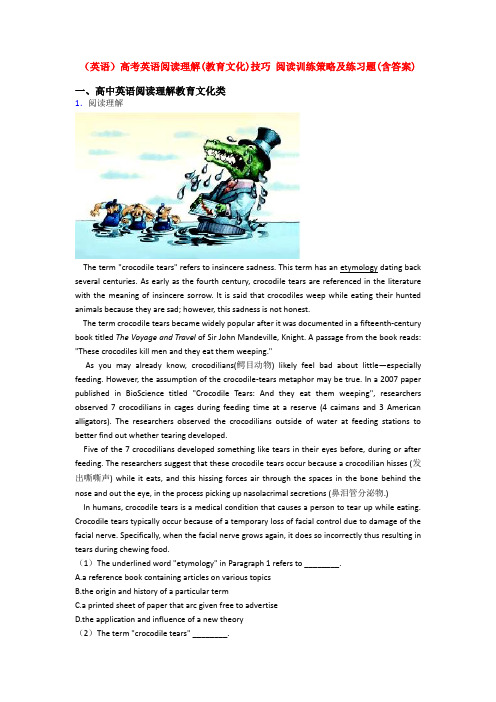
(英语)高考英语阅读理解(教育文化)技巧阅读训练策略及练习题(含答案)一、高中英语阅读理解教育文化类1.阅读理解The term "crocodile tears" refers to insincere sadness. This term has an etymology dating back several centuries. As early as the fourth century, crocodile tears are referenced in the literature with the meaning of insincere sorrow. It is said that crocodiles weep while eating their hunted animals because they are sad; however, this sadness is not honest.The term crocodile tears became widely popular after it was documented in a fifteenth-century book titled The Voyage and Travel of Sir John Mandeville, Knight. A passage from the book reads: "These crocodiles kill men and they eat them weeping."As you may already know, crocodilians(鳄目动物) likely feel bad about little—especially feeding. However, the assumption of the crocodile-tears metaphor may be true. In a 2007 paper published in BioScience titled "Crocodile Tears: And they eat them weeping", researchers observed 7 crocodilians in cages during feeding time at a reserve (4 caimans and 3 American alligators). The researchers observed the crocodilians outside of water at feeding stations to better find out whether tearing developed.Five of the 7 crocodilians developed something like tears in their eyes before, during or after feeding. The researchers suggest that these crocodile tears occur because a crocodilian hisses (发出嘶嘶声) while it eats, and this hissing forces air through the spaces in the bone behind the nose and out the eye, in the process picking up nasolacrimal secretions (鼻泪管分泌物.)In humans, crocodile tears is a medical condition that causes a person to tear up while eating. Crocodile tears typically occur because of a temporary loss of facial control due to damage of the facial nerve. Specifically, when the facial nerve grows again, it does so incorrectly thus resulting in tears during chewing food.(1)The underlined word "etymology" in Paragraph 1 refers to ________.A.a reference book containing articles on various topicsB.the origin and history of a particular termC.a printed sheet of paper that arc given free to advertiseD.the application and influence of a new theory(2)The term "crocodile tears" ________.A.is a medical condition that causes a crocodile to tear upB.became widely popular as early as the fourth centuryC.refers to pretended sadnessD.proved to be only an assumption(3)From the 2007 paper published in BioScience, we can know that ________.A.crocodilians especially feel bad about feedingB.not all the 7 crocodilians developed tearingC.the crocodilians were carefully observed inside waterD.crocodile tears occur because a crocodilian hisses after it eats(4)The passage is mainly about ________.A.what the real truth is about crocodile tearsB.when the term "crocodile tears" got popular in literatureC.how researchers made the experiment on crocodiliansD.why crocodile tears typically occur in humans【答案】(1)B(2)C(3)B(4)A【解析】【分析】本文是一篇说明文,通过引用“鳄鱼的眼泪”这一说法的来源、发展以及相关实验来告诉读者“crocodile tears”的真实含义。
高考任务型阅读题特点及解题策略
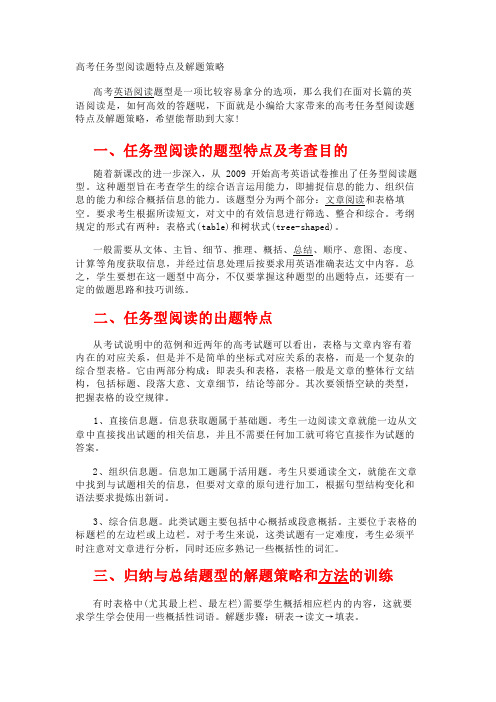
高考任务型阅读题特点及解题策略高考英语阅读题型是一项比较容易拿分的选项,那么我们在面对长篇的英语阅读是,如何高效的答题呢,下面就是小编给大家带来的高考任务型阅读题特点及解题策略,希望能帮助到大家!随着新课改的进一步深入,从 2009 开始高考英语试卷推出了任务型阅读题型。
这种题型旨在考查学生的综合语言运用能力,即捕捉信息的能力、组织信息的能力和综合概括信息的能力。
该题型分为两个部分:文章阅读和表格填空。
要求考生根据所读短文,对文中的有效信息进行筛选、整合和综合。
考纲规定的形式有两种:表格式(table)和树状式(tree-shaped)。
一般需要从文体、主旨、细节、推理、概括、总结、顺序、意图、态度、计算等角度获取信息,并经过信息处理后按要求用英语准确表达文中内容。
总之,学生要想在这一题型中高分,不仅要掌握这种题型的出题特点,还要有一定的做题思路和技巧训练。
从考试说明中的范例和近两年的高考试题可以看出,表格与文章内容有着内在的对应关系,但是并不是简单的坐标式对应关系的表格,而是一个复杂的综合型表格。
它由两部分构成:即表头和表格,表格一般是文章的整体行文结构,包括标题、段落大意、文章细节,结论等部分。
其次要领悟空缺的类型,把握表格的设空规律。
1、直接信息题。
信息获取题属于基础题。
考生一边阅读文章就能一边从文章中直接找出试题的相关信息,并且不需要任何加工就可将它直接作为试题的答案。
2、组织信息题。
信息加工题属于活用题。
考生只要通读全文,就能在文章中找到与试题相关的信息,但要对文章的原句进行加工,根据句型结构变化和语法要求提炼出新词。
3、综合信息题。
此类试题主要包括中心概括或段意概括。
主要位于表格的标题栏的左边栏或上边栏。
对于考生来说,这类试题有一定难度,考生必须平时注意对文章进行分析,同时还应多熟记一些概括性的词汇。
有时表格中(尤其最上栏、最左栏)需要学生概括相应栏内的内容,这就要求学生学会使用一些概括性词语。
高考英语任务型阅读训练经典题目(及答案)
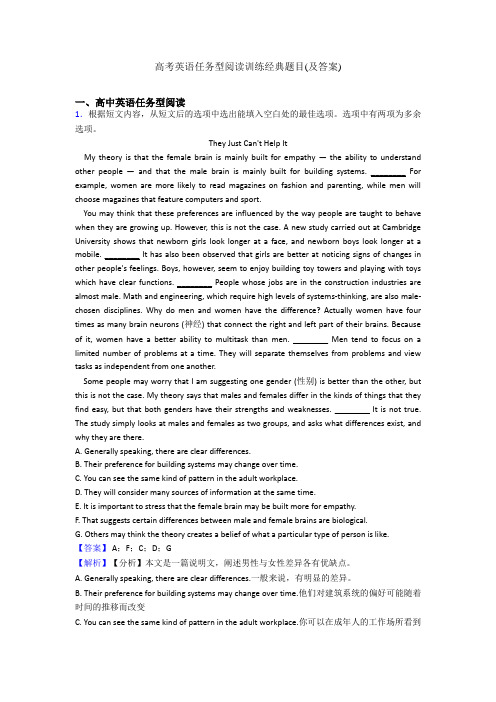
高考英语任务型阅读训练经典题目(及答案)一、高中英语任务型阅读1.根据短文内容,从短文后的选项中选出能填入空白处的最佳选项。
选项中有两项为多余选项。
They Just Can't Help ItMy theory is that the female brain is mainly built for empathy —the ability to understand other people —and that the male brain is mainly built for building systems. ________ For example, women are more likely to read magazines on fashion and parenting, while men will choose magazines that feature computers and sport.You may think that these preferences are influenced by the way people are taught to behave when they are growing up. However, this is not the case. A new study carried out at Cambridge University shows that newborn girls look longer at a face, and newborn boys look longer at a mobile. ________ It has also been observed that girls are better at noticing signs of changes in other people's feelings. Boys, however, seem to enjoy building toy towers and playing with toys which have clear functions. ________ People whose jobs are in the construction industries are almost male. Math and engineering, which require high levels of systems-thinking, are also male-chosen disciplines. Why do men and women have the difference? Actually women have four times as many brain neurons (神经) that connect the right and left part of their brains. Because of it, women have a better ability to multitask than men. ________ Men tend to focus on a limited number of problems at a time. They will separate themselves from problems and view tasks as independent from one another.Some people may worry that I am suggesting one gender (性别) is better than the other, but this is not the case. My theory says that males and females differ in the kinds of things that they find easy, but that both genders have their strengths and weaknesses. ________ It is not true. The study simply looks at males and females as two groups, and asks what differences exist, and why they are there.A. Generally speaking, there are clear differences.B. Their preference for building systems may change over time.C. You can see the same kind of pattern in the adult workplace.D. They will consider many sources of information at the same time.E. It is important to stress that the female brain may be built more for empathy.F. That suggests certain differences between male and female brains are biological.G. Others may think the theory creates a belief of what a particular type of person is like.【答案】 A;F;C;D;G【解析】【分析】本文是一篇说明文,阐述男性与女性差异各有优缺点。
英语高考任务型阅读技巧(精选5篇)
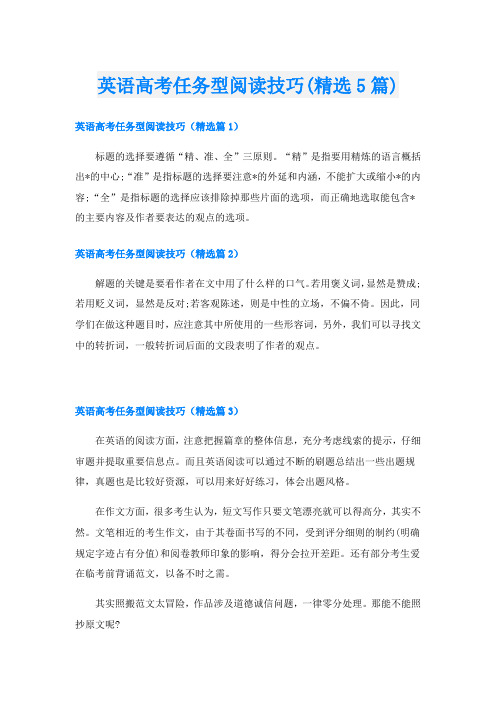
英语高考任务型阅读技巧(精选5篇)英语高考任务型阅读技巧(精选篇1)标题的选择要遵循“精、准、全”三原则。
“精”是指要用精炼的语言概括出*的中心;“准”是指标题的选择要注意*的外延和内涵,不能扩大或缩小*的内容;“全”是指标题的选择应该排除掉那些片面的选项,而正确地选取能包含*的主要内容及作者要表达的观点的选项。
英语高考任务型阅读技巧(精选篇2)解题的关键是要看作者在文中用了什么样的口气。
若用褒义词,显然是赞成;若用贬义词,显然是反对;若客观陈述,则是中性的立场,不偏不倚。
因此,同学们在做这种题目时,应注意其中所使用的一些形容词,另外,我们可以寻找文中的转折词,一般转折词后面的文段表明了作者的观点。
英语高考任务型阅读技巧(精选篇3)在英语的阅读方面,注意把握篇章的整体信息,充分考虑线索的提示,仔细审题并提取重要信息点。
而且英语阅读可以通过不断的刷题总结出一些出题规律,真题也是比较好资源,可以用来好好练习,体会出题风格。
在作文方面,很多考生认为,短文写作只要文笔漂亮就可以得高分,其实不然。
文笔相近的考生作文,由于其卷面书写的不同,受到评分细则的制约(明确规定字迹占有分值)和阅卷教师印象的影响,得分会拉开差距。
还有部分考生爱在临考前背诵范文,以备不时之需。
其实照搬范文太冒险,作品涉及道德诚信问题,一律零分处理。
那能不能照抄原文呢?答案也是不行的,英语作文尽量要尝试用自己的话语表达意思,如果一定要使用模板也是先背诵模板,能够背诵后要在能够灵活使用的基础上在使用,将模板转换为自己的语言才是比较好的。
在往年阅卷中还发现,部分考生仅仅对某一个或几个语法现象记忆深刻,导致在填写完成句子时,大部分题目都使用的是某一种语法结构,这样答题显然与考试要求违背,因为同一个语法知识点不会重复考查。
考生还是应该了解考试说明中所要求掌握的单词、词组、句型和语法有哪些,对一些常考的项目了然于心。
有效适度地使用从句和连接词。
英语高考任务型阅读技巧(精选篇4)细节题的命题方法很多,如可能是对某个细节用同义结构转换后进行考查、也可能是将*中的几个细节(通常是四个)放在一起要求考生判断是非(选出正确的一项或选出错误的一项)或对几个细节进行排序等。
全攻略-高中英语阅读理解题型体裁解读、解题技巧及练习(附答案)
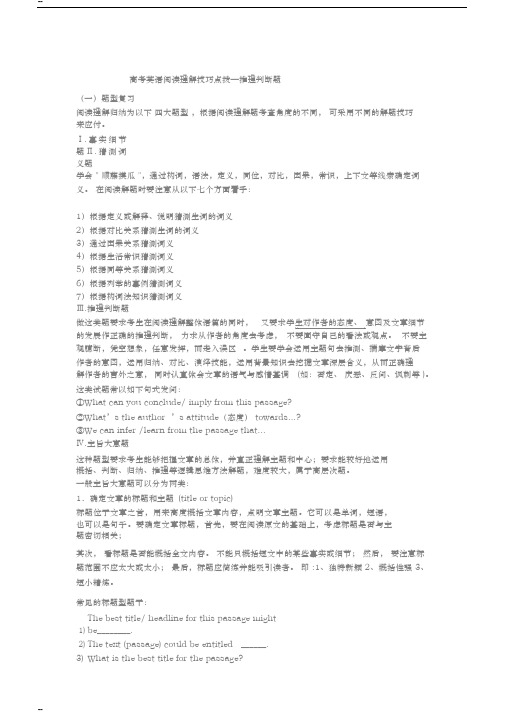
高考英语阅读理解技巧点拨—推理判断题(一)题型复习阅读理解归纳为以下四大题型,根据阅读理解题考查角度的不同,可采用不同的解题技巧来应付。
Ⅰ.事实细节题Ⅱ.猜测词义题学会 " 顺藤摸瓜 ",通过构词,语法,定义,同位,对比,因果,常识,上下文等线索确定词义。
在阅读解题时要注意从以下七个方面着手:1)根据定义或解释、说明猜测生词的词义2)根据对比关系猜测生词的词义3)通过因果关系猜测词义4)根据生活常识猜测词义5)根据同等关系猜测词义6)根据列举的事例猜测词义7)根据构词法知识猜测词义Ⅲ.推理判断题做这类题要求考生在阅读理解整体语篇的同时,又要求学生对作者的态度、意图及文章细节的发展作正确的推理判断,力求从作者的角度去考虑,不要固守自己的看法或观点。
不要主观臆断,凭空想象,任意发挥,而走入误区。
学生要学会运用主题句去推测、揣摩文字背后作者的意图,运用归纳、对比、演绎技能,运用背景知识去挖掘文章深层含义,从而正确理解作者的言外之意,同时认真体会文章的语气与感情基调(如:否定、厌恶、反问、讽刺等 )。
这类试题常以如下句式发问:①What can you conclude/ imply from this passage?②What’s the author ’s attitude(态度) towards...?③We can infer /learn from the passage that...Ⅳ.主旨大意题这种题型要求考生能够把握文章的总体,并真正理解主题和中心;要求能较好地运用概括、判断、归纳、推理等逻辑思维方法解题,难度较大,属于高层次题。
一般主旨大意题可以分为两类:1.确定文章的标题和主题(title or topic)标题位于文章之首,用来高度概括文章内容,点明文章主题。
它可以是单词,短语,也可以是句子。
要确定文章标题,首先,要在阅读原文的基础上,考虑标题是否与主题密切相关;其次,看标题是否能概括全文内容。
高中英语阅读理解题型解读、解题技巧及练习(教师版)

高中阅读理解题型解读(教师版)(一)阅读是获得更综合、更复杂、更精确信息的必要手段,考生在做阅读理解时,不仅要看懂文章的字面意思,还需要针对不同题材和体裁的篇目运用不同的方法作出正确的选择。
一般来说,词汇、阅读速度和理解能力是阅读理解中三个最重要且有相互联系的因素。
阅读的方法可以使用以下几种:1.跳读:就是快速的一步阅读法。
实际上是有选择阅读,找关键词。
用这种阅读方法回答who、what、when、where之类的问题最为有效。
2.略读:指比跳读慢些的二步阅读法。
即泛泛地、粗略地快速阅读,目的是了解大意,对文章有个总的概念。
此种阅读方法能回答why、how之类的问题。
3.精读:即最细致、最慢的深层阅读方法,目的是求得对所读文章的全部意义的理解与掌握。
在使用阅读技巧时尽量做到以下几点:1.带着问题阅读短文。
2.找出主题句、确定中心思想。
3.推断单词、句子和文章的含义。
4.尽快选择答案。
(二)不同体裁文章的特点及解题技巧1.记叙文记叙文又可分传记类和故事类。
传记类文章在阅读中时间是全文的关键,根据时间我们可以找到相关的事件,抓住文章的主要内容。
故事类文章情节性较强,阅读时要注意故事中的时间、地点、人物和发生的事件,这些都是文章中的主要内容和信息,对于准确理解文章十分重要。
2.说明文说明文是对事物的形状、性质、特征、成果或功用等进行介绍,解释或阐述的文章。
把握所说明事物的特征和本质是理解说明文的关键。
说明事物特征的方法很多,主要有定义法、解释法、比较法、比喻法、数字法、图表法、引用法和举例法等。
●数字说明文在阅读数字说明文时要特别注意文中数字的含义,从这些数字中可以找到文章的主要内容。
●解释说明文解释说明文着重说明事物的本质、特征和功用等。
许多科普文章都属于这一类。
在阅读这类文章时要学会解决what, how, why 等一类的问题。
它们是文章的关键。
如能带着这些问题阅读,将会更迅速抓住文章的主题。
●比较说明文比较说明文是通过对比方法说明问题。
2024年高考英语文学作品分析答案解析
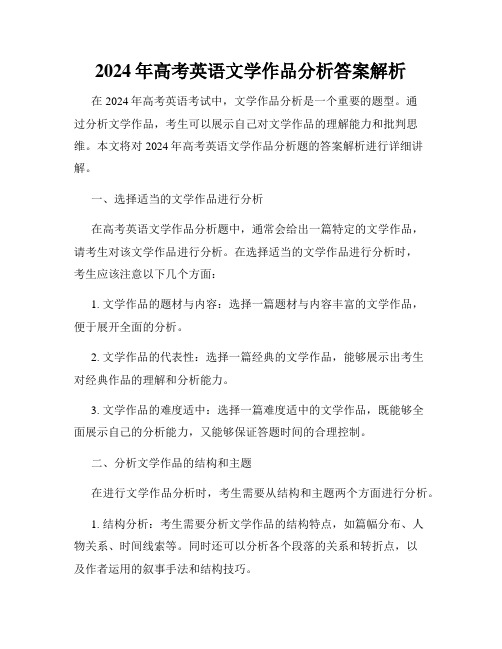
2024年高考英语文学作品分析答案解析在2024年高考英语考试中,文学作品分析是一个重要的题型。
通过分析文学作品,考生可以展示自己对文学作品的理解能力和批判思维。
本文将对2024年高考英语文学作品分析题的答案解析进行详细讲解。
一、选择适当的文学作品进行分析在高考英语文学作品分析题中,通常会给出一篇特定的文学作品,请考生对该文学作品进行分析。
在选择适当的文学作品进行分析时,考生应该注意以下几个方面:1. 文学作品的题材与内容:选择一篇题材与内容丰富的文学作品,便于展开全面的分析。
2. 文学作品的代表性:选择一篇经典的文学作品,能够展示出考生对经典作品的理解和分析能力。
3. 文学作品的难度适中:选择一篇难度适中的文学作品,既能够全面展示自己的分析能力,又能够保证答题时间的合理控制。
二、分析文学作品的结构和主题在进行文学作品分析时,考生需要从结构和主题两个方面进行分析。
1. 结构分析:考生需要分析文学作品的结构特点,如篇幅分布、人物关系、时间线索等。
同时还可以分析各个段落的关系和转折点,以及作者运用的叙事手法和结构技巧。
2. 主题分析:考生需要分析文学作品的主题思想,找出作品中的核心观点和情感体验。
可以从人物形象、情节发展、语言运用等方面来揭示作者的主题意图,并结合具体的文本细节进行分析。
三、运用文学理论进行分析在作品分析中,考生可以运用一些文学理论来提高分析的深度和广度。
如:1. 符号学分析:通过分析文学作品中的具体符号和象征,揭示隐含在其中的意义和作用。
2. 经典文学理论:如传统文学理论、现代文学理论等,可以帮助考生对文学作品进行更加系统和深入的分析。
3. 文学批评方法:如形式主义、结构主义、后现代主义等,可以帮助考生从不同角度审视文学作品,并提供多样化的分析观点。
四、注重文本细节和分析依据在作品分析时,考生应该注重对文本细节的分析,同时提供足够的分析依据。
例如,通过引用文本中的段落或者语句来支持自己的观点和分析结论,进一步增强分析的可信度和说服力。
高中英语阅读理解题型分析及应对策略

中学英语阅读理解题型分析与应对策略阅读理解是读者利用自己的语言学问和背景学问对读物所进行的一种主动的思维过程。
阅读理解题能集中、全面地检测考生从阅读中获得与加工信息的实力,客观地反映考生对阅读材料理解的精确性与透彻性。
阅读理解实力,即对信息的理解、筛选、加工的实力。
阅读理解题始终都是高考英语考查的重中之重并且题目分值占总分比重最大(高达约27%)。
因此,能否做好阅读理解干脆关系到英语成果的凹凸。
本文从阅读理解的题型为切入点,结合自己的教学阅历,实例解析历年高考真题,探究归纳提高阅读理解实力的方法和应试技巧,以期能帮助中学生提高阅读实力。
从体裁方面看,高考阅读理解尽量追求体裁的多样化。
总的说来,一般分为以下四种:记叙文、说明文、应用文和争论文。
近9年高考阅读理解对体裁的考查呈这样的趋势:说明文一般占31%左右;记叙文占23%左右;应用文占13%左右;争论文占16%左右,夹叙夹议占17%。
(详见下图7)考查最多的是说明文,特殊是介绍国外新科技、新独创的文章,始终是高考考查的热点,这也符合学习外语的根本目的。
争论文的考查往往是难度最大、最有区分度的体裁,考生失误较多的题目往往出现在争论文,因此大家对争论文也应当赐予足够的重视。
呈现题材的丰富性高考阅读理解留意题材的多样化、现代化和生活化,不仅主题广泛、科学好用,而且生动好玩。
阅读理解涵盖了人物故事、名人传记、前沿科技、环境爱护、地理现象和历史文化等话题,并且趋向于当今世界的热点话题,充分体现了语言是文化的载体这一重要思想。
相较来看,社会文化、人物故事、科普学问和时文报道类的文章占有较大的比重(详见下图8)。
不同题型考查了学生不同层面的阅读实力,同时又有所侧重阅读理解题型多样,比较全面的考查了考生不同层面的阅读实力。
题型分布合理,以细微环节理解题为主,对推理推断题和主旨大意题的考查整体呈上升趋势。
(详见下图9)综上所述,我们不难发觉,体裁多样化,题材丰富化,题型的实力化,已成为高考英语阅读理解考查的一个趋势。
高中英语教案:文学作品阅读与分析

高中英语教案:文学作品阅读与分析引言英语教育是中国教育体系中的重要组成部分。
在高中阶段,学生们将接触各种文学作品。
文学作品的阅读与分析对于学生的英语学习和综合能力的培养非常重要。
本教案旨在帮助高中英语教师为学生开展文学作品阅读与分析课程提供指导。
文学作品阅读的重要性文学作品是人类智慧和情感的结晶,能够让我们领略不同文化和价值观的存在。
通过阅读文学作品,学生们可以提高他们的语言技能、拓宽他们的视野、培养他们的想象力,并且更好地理解各种文化和社会现象。
教学目标•培养学生的文学阅读兴趣•提高学生的文学作品阅读能力•培养学生的文学作品分析能力•帮助学生理解文学作品的深层意义和文化内涵教学内容文学作品的选择在设计文学作品阅读与分析课程时,教师应该根据学生的年级、英语水平和文化背景选择适合的文学作品。
可以选择一些经典的文学作品,如莎士比亚的戏剧、狄更斯的小说等。
同时,也可以选择一些现代的文学作品,如约翰·格林的短篇小说、杰拉尔德·达雷尔的散文等。
阅读文学作品的技巧对于学生来说,阅读文学作品可能是一项艰巨的任务。
教师可以通过以下几个步骤来帮助学生提高阅读文学作品的能力:1.阅读前预习:教师可以引导学生在阅读之前先了解文学作品的作者、背景和主题等相关信息,以便更好地理解作品。
2.理解故事情节:学生应该仔细阅读文学作品,理解故事情节的发展和人物之间的关系。
3.挖掘深层意义:教师可以帮助学生分析文学作品中的隐喻、象征、主题等深层意义,引导学生思考作者的用意。
4.词汇与语法学习:教师可以通过文学作品来教授一些高级词汇和语法结构,帮助学生提高他们的语言技能。
文学作品的分析方法在阅读文学作品的基础上,学生还应该学会对作品进行分析。
以下是一些常用的文学作品分析方法:1.文学作品的主题分析:学生应该思考作品中的主题是什么,作者通过作品传递了怎样的思想和价值观。
2.文学作品的情感分析:学生可以分析作品中人物的情感变化和作者的叙述手法,体会作品给人的情感共鸣。
高中英语阅读教案文学作品分析
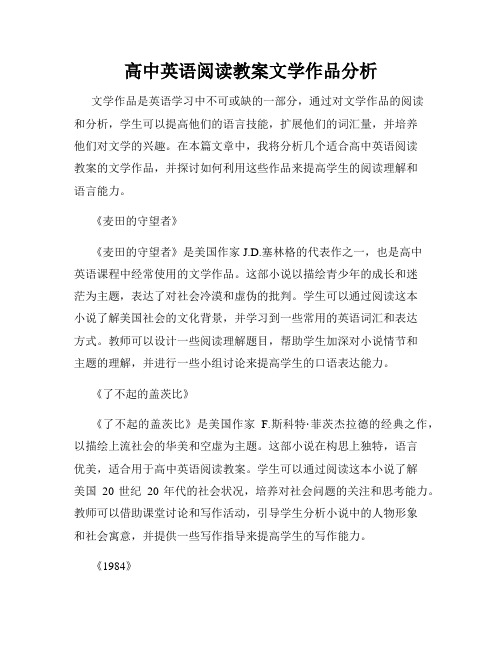
高中英语阅读教案文学作品分析文学作品是英语学习中不可或缺的一部分,通过对文学作品的阅读和分析,学生可以提高他们的语言技能,扩展他们的词汇量,并培养他们对文学的兴趣。
在本篇文章中,我将分析几个适合高中英语阅读教案的文学作品,并探讨如何利用这些作品来提高学生的阅读理解和语言能力。
《麦田的守望者》《麦田的守望者》是美国作家J.D.塞林格的代表作之一,也是高中英语课程中经常使用的文学作品。
这部小说以描绘青少年的成长和迷茫为主题,表达了对社会冷漠和虚伪的批判。
学生可以通过阅读这本小说了解美国社会的文化背景,并学习到一些常用的英语词汇和表达方式。
教师可以设计一些阅读理解题目,帮助学生加深对小说情节和主题的理解,并进行一些小组讨论来提高学生的口语表达能力。
《了不起的盖茨比》《了不起的盖茨比》是美国作家 F.斯科特·菲茨杰拉德的经典之作,以描绘上流社会的华美和空虚为主题。
这部小说在构思上独特,语言优美,适合用于高中英语阅读教案。
学生可以通过阅读这本小说了解美国20世纪20年代的社会状况,培养对社会问题的关注和思考能力。
教师可以借助课堂讨论和写作活动,引导学生分析小说中的人物形象和社会寓意,并提供一些写作指导来提高学生的写作能力。
《1984》《1984》是乔治·奥威尔的著名小说,描述了一个被极权统治的未来社会。
这本小说深刻地探讨了政治权力和个体自由的关系,对于高中英语阅读教案来说是一个很好的选择。
学生可以通过阅读这本小说了解英国社会的历史和政治背景,并思考现实社会中的权力问题。
教师可以组织学生进行小组讨论和辩论活动,引导他们分析小说中的社会现象,并进行写作练习来提高学生的论述能力。
总结:通过对以上几个文学作品的分析,我们可以看到,高中英语阅读教案中的文学作品不仅能够提高学生的语言能力,还可以培养他们的思考和表达能力。
教师可以根据学生的水平和兴趣选择适合的作品,并结合课堂活动来引导学生深入理解和分析文学作品。
高中英语高考阅读理解经典题型解答方法指导(共9种)

高考英语阅读理解经典题型解答方法指导一、例证题①例证题的标记。
当题干中出现example,case,illustrate,illustration,exemplify时。
②返回原文,找出该例证所在的位置,既给该例子定位。
③搜索该例证周围的区域,90%向上,10%向下,找出该例证支持的观点。
例子周围具有概括抽象性的表达通常就是它的论点。
注意:举例的目的是为了支持论点或是为了说明主题句。
举例后马上问这个例子说明了什么问题?不能用例子中的话来回答这个问题。
④找出该论点,并与四个选项比较,得出选项中与该论点最一致的答案。
⑤例证题错误答案设计的干扰特征经常是:就事论事。
即用例子中的某一内容拉出来让你去选。
(╳)要求:在阅读中,遇到长的例子,立即给这个例子定位,即找出起始点,从哪开始到哪结束。
二、指代题①返回原文,找出出题的指代词。
②向上搜索,找最近的名词、名词性短语或句子(先从最近点开始找,找不到再找次近的,一般答案不会离得太远)。
③将找到的词、词组或句子的意思代入替换该指代词,看其意思是否通顺。
④将找到的词、词组或句子与四个选项进行比较,找出最佳答案。
三、词汇题“搜索代入”法①返回原文,找出该词汇出现的地方。
②确定该词汇的词性③从上下文(词汇的前后几句)中找到与所给词汇具有相同词性的词(如一下子找不到就再往上往下找),代入所给词汇在文章中的位置(将之替换)看语义是否合适④找出选项中与代替词意思相同或相近的选相,即答案。
注意:a.如果该词汇是简单词汇,则其字面意思必然不是正确答案。
b.高考阅读不是考察字认识不认识,而是考察是否能根据上下文作出正确的判断。
c.词汇题的正确答案经常蕴藏在原文该词汇出现的附近。
注意不能靠单词词义直接往下推。
d.寻找时要注意同位语、特殊标点(比如分号,分号前后两句话的逻辑关系不是形式上的并列就是语义上的并列,也就是两句话的意思相同,所以可用其中一句话的意思来推测另一句话的意思从而推出所给词汇含义)、定语从句、前后缀,特别要注意寻找时的同性原则。
高考英语任务型阅读试题评析及备考建议
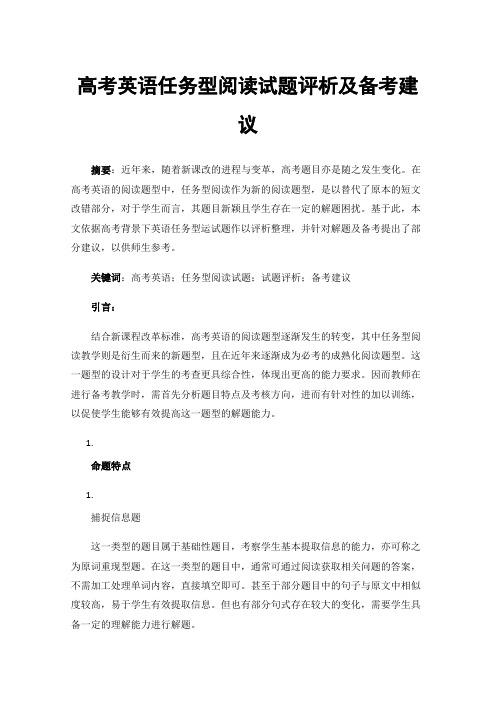
高考英语任务型阅读试题评析及备考建议摘要:近年来,随着新课改的进程与变革,高考题目亦是随之发生变化。
在高考英语的阅读题型中,任务型阅读作为新的阅读题型,是以替代了原本的短文改错部分,对于学生而言,其题目新颖且学生存在一定的解题困扰。
基于此,本文依据高考背景下英语任务型运试题作以评析整理,并针对解题及备考提出了部分建议,以供师生参考。
关键词:高考英语;任务型阅读试题;试题评析;备考建议引言:结合新课程改革标准,高考英语的阅读题型逐渐发生的转变,其中任务型阅读教学则是衍生而来的新题型,且在近年来逐渐成为必考的成熟化阅读题型。
这一题型的设计对于学生的考查更具综合性,体现出更高的能力要求。
因而教师在进行备考教学时,需首先分析题目特点及考核方向,进而有针对性的加以训练,以促使学生能够有效提高这一题型的解题能力。
1.命题特点1.捕捉信息题这一类型的题目属于基础性题目,考察学生基本提取信息的能力,亦可称之为原词重现型题。
在这一类型的题目中,通常可通过阅读获取相关问题的答案,不需加工处理单词内容,直接填空即可。
甚至于部分题目中的句子与原文中相似度较高,易于学生有效提取信息。
但也有部分句式存在较大的变化,需要学生具备一定的理解能力进行解题。
组织信息题这一类题型具有一定的灵活度,建立在学生得以将知识有效重组的基础上,考察学生能够以多种方式进行表达的语言能力,具有遣词造句的考察性质[1]。
此外,在此类题目中,具有限定一空一词的特点,因而需要学生具备一定的逆向思维。
在此基础上,还可进一步细分为两种类型:1.词型转换型在进行此类题目的练习中,需要学生在有效捕捉相关信息的基础上,进一步加工,以通过将词汇词形的转变等方式,进而获取答案,比如名词的单复数、动词的适当形式、比较级最高级等。
1.句意转换型此类题型与词型转换型题目类似,亦需要将信息二次加工,通过将表格中的句型分析对比之后,将句子的结构进行调整转换,比如同义词、反义词、句意的整合理解等等,进而将适当的词汇填入其中。
【备考高考】高考英语任务型阅读试题(附答案)
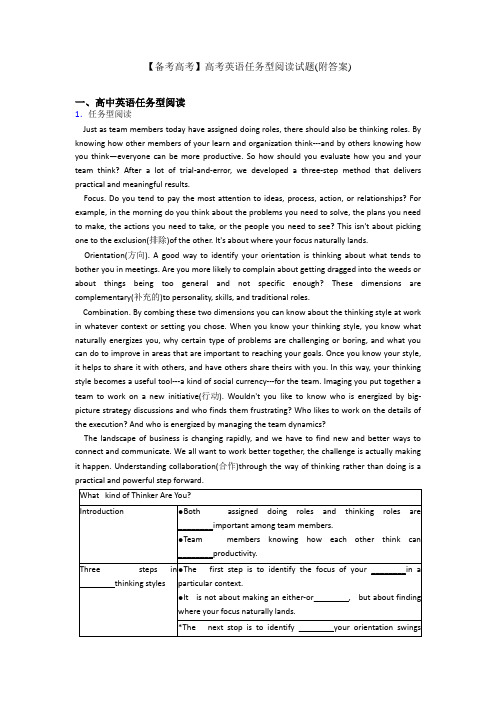
【备考高考】高考英语任务型阅读试题(附答案)一、高中英语任务型阅读1.任务型阅读Just as team members today have assigned doing roles, there should also be thinking roles. By knowing how other members of your learn and organization think---and by others knowing how you think—everyone can be more productive. So how should you evaluate how you and your team think? After a lot of trial-and-error, we developed a three-step method that delivers practical and meaningful results.Focus. Do you tend to pay the most attention to ideas, process, action, or relationships? For example, in the morning do you think about the problems you need to solve, the plans you need to make, the actions you need to take, or the people you need to see? This isn't about picking one to the exclusion(排除)of the other. It's about where your focus naturally lands.Orientation(方向). A good way to identify your orientation is thinking about what tends to bother you in meetings. Are you more likely to complain about getting dragged into the weeds or about things being too general and not specific enough? These dimensions are complementary(补充的)to personality, skills, and traditional roles.Combination. By combing these two dimensions you can know about the thinking style at work in whatever context or setting you chose. When you know your thinking style, you know what naturally energizes you, why certain type of problems are challenging or boring, and what you can do to improve in areas that are important to reaching your goals. Once you know your style, it helps to share it with others, and have others share theirs with you. In this way, your thinking style becomes a useful tool---a kind of social currency---for the team. Imaging you put together a team to work on a new initiative(行动). Wouldn't you like to know who is energized by big-picture strategy discussions and who finds them frustrating? Who likes to work on the details of the execution? And who is energized by managing the team dynamics?The landscape of business is changing rapidly, and we have to find new and better ways to connect and communicate. We all want to work better together, the challenge is actually making it happen. Understanding collaboration(合作)through the way of thinking rather than doing is a practical and powerful step forward.【答案】equally;improve/increase;evaluating;thinking;choice;whether;combine;contributes/leads;Conclusion;how【解析】【分析】本文是一篇说明文,正如今天的团队成员分配的角色一样,也应该有思考的角色,两者同样重要。
高考英语任务型阅读分析及备考策略
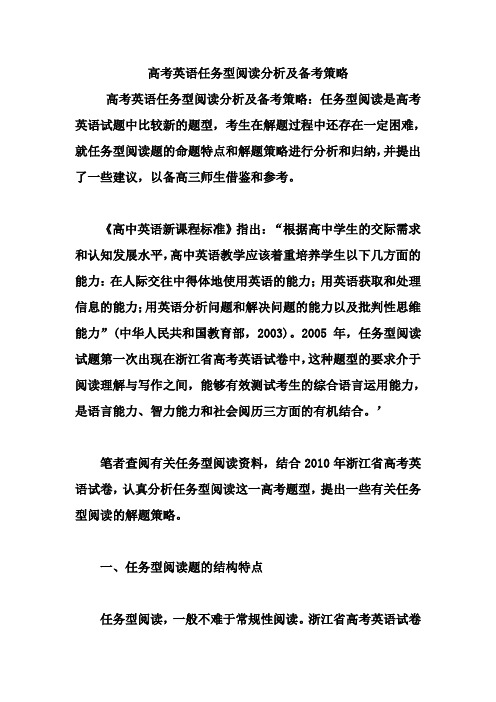
高考英语任务型阅读分析及备考策略高考英语任务型阅读分析及备考策略:任务型阅读是高考英语试题中比较新的题型,考生在解题过程中还存在一定困难,就任务型阅读题的命题特点和解题策略进行分析和归纳,并提出了一些建议,以备高三师生借鉴和参考。
《高中英语新课程标准》指出:“根据高中学生的交际需求和认知发展水平,高中英语教学应该着重培养学生以下几方面的能力:在人际交往中得体地使用英语的能力;用英语获取和处理信息的能力;用英语分析问题和解决问题的能力以及批判性思维能力”(中华人民共和国教育部,2003)。
2005年,任务型阅读试题第一次出现在浙江省高考英语试卷中,这种题型的要求介于阅读理解与写作之间,能够有效测试考生的综合语言运用能力,是语言能力、智力能力和社会阅历三方面的有机结合。
’笔者查阅有关任务型阅读资料,结合2010年浙江省高考英语试卷,认真分析任务型阅读这一高考题型,提出一些有关任务型阅读的解题策略。
一、任务型阅读题的结构特点任务型阅读,一般不难于常规性阅读。
浙江省高考英语试卷中的任务型阅读题给出六段阅读材料,布置五个话题,要求考生将这五个话题与所给的六段阅读材料中的五段一一对应(有一段是多余的)。
该对应可能是主旨对应,也可能是情节对应,还可以是细节对应等。
任务型阅读的命题特点可归纳为以下两点:1、突出体现文章结构与层次任务型阅读题与传统的阅读理解题的主要区别就在于它对文章结构和层次的体现。
从大标题(文章主题)到小标题(论述的各个侧面或分析列举),再到各个细节的全面分析。
2.强调捕捉与组织信息的能力任务型阅读设题的初衷是考查考生对信息的综合加工和处理能力,其信息不仅体现在阅读短文中,还体现在对表格信息的比较和理解中。
常见的命题类型有三种,即捕捉信息题、组织信息题和归纳信息题。
二、任务型阅读题的解题步骤考生答好该题的要诀有两个:一是理解段落主旨和细节,同时既注重文章中文段的字面意思。
也要领悟其可能隐含的意思;二是切实做到仔细阅读,观察敏锐,精确配对。
最新牛津译林版高一英语任务型阅读解题技巧及专项训练

牛津译林版高一英语任务型阅读解题技巧及专项训练英语任务型阅读专项训练任务型阅读解题策略:1.略读。
理解文章大意是做题的第一步,也是关键的一步。
因此,要快速浏览全文,尤其是每段的第一句话,即Topic sentence和首尾段落,理清文章的写作思路和基本结构,以便加深对文章内容的了解。
同时文章的结构往往也是很重要的设题线索。
表格项目可能就是根据文章的结构而设计的。
只有读懂了文章,才能顺利地在表格中填出相应的信息。
2.扫读。
扫读图表,分析表格结构,理清其显示的层次关系,准确定位其考察要求。
要特别注意表格前的小标题,它通常就是段落和表格的主题句。
读懂了表格标题有助于理解短文及表格的大意,了解表格结构和题目的设置。
如捕捉信息题可以去文中查读,其他问题则需要对信息进行加工处理。
一般题目的结构是:①全文的标题在标题中缺少一个关键词,根据文章填出所缺的关键词。
②各段大意试题中给出各段大意,在给出的信息中缺少一些关键内容,学生把文章的各段对应起来,找准信息。
③对各段大意的详细的阐述从文章各段或分散在全文的对应的信息点出发,这要求学生有高度驾驭语篇的能力,在文章中找到准确的信息完成填空。
3.精读。
深入理解文章内容,精读与空格中要填的信息有关的文段,寻找确定答案的关键词语,或从文中进行概括,同时仔细斟酌用词,确保填的是最恰当词的最恰当形式。
如填写时要注意所填单词的结构和形式,看是否与表格中所给的格式相同,同时注意单词的拼写、短语的搭配、所填词汇的词性、所填单词是否符合题目要求,还要注意字母的大小写。
4. 复查。
通观全篇文章,务必再仔细核对文章和任务,确保准确性。
★归纳概括的注意事项有:(1)大小写(2)单复数(3)搭配掌握常见的归纳概括词语:(1)赞成和反对的理由pros and cons(2) 优劣 advantages,disadvantages(3) 异同 similarities, differences(4) 建议 suggestions, tips, advice(5) 态度、观点 attitudes to/towards, opinion of(6) 简介某个现象或问题 brief/general introduction, phenomenon(phenomena), problem(s)(一)请认真阅读下面短文,并根据所读内容在文章后图表中的空格里填入最恰当的单词。
英语考试《文学作品阅读》答题技巧
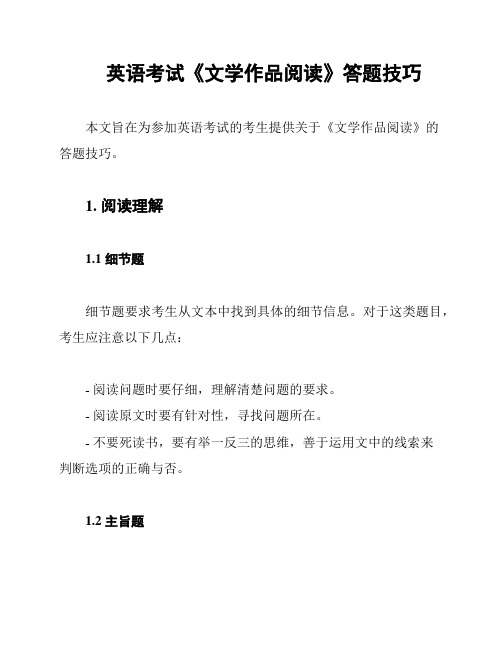
英语考试《文学作品阅读》答题技巧本文旨在为参加英语考试的考生提供关于《文学作品阅读》的答题技巧。
1. 阅读理解1.1 细节题细节题要求考生从文本中找到具体的细节信息。
对于这类题目,考生应注意以下几点:- 阅读问题时要仔细,理解清楚问题的要求。
- 阅读原文时要有针对性,寻找问题所在。
- 不要死读书,要有举一反三的思维,善于运用文中的线索来判断选项的正确与否。
1.2 主旨题主旨题要求考生理解整篇文章的主要观点或中心思想。
在回答主旨题时,考生可以采取以下方法:- 首先快速浏览全文,抓住文章的大致内容。
- 然后仔细阅读文章的首段和尾段,找出作者的观点或主题。
- 注意文章的标题或关键词,它们通常与文章的主旨紧密相关。
1.3 推理题推理题要求考生在阅读理解中进行逻辑推理或假设。
要避免个人主观臆断和过度解读,考生可以考虑以下方法:- 阅读原文时要关注细节和线索,尽量寻找深层意义。
- 根据已有线索进行合理推断,而不要凭空臆断。
- 对于涉及假设的题目,要从现实角度出发,选择最符合逻辑和语境的选项。
2. 文学作品分析2.1 理解背景和文化意义在分析文学作品时,考生应理解作品的社会背景和文化意义,从而更好地理解和解读作品的内涵。
考生可以采取以下步骤:- 在阅读文学作品之前,先了解作者的背景、时代背景和文化背景。
- 注意作品中涉及的历史事件、社会现象和文化象征,理解其与作品主题的联系。
2.2 解读主题和象征作品的主题和象征是文学作品深层意义的重要体现。
在解读主题和象征时,考生可以考虑以下方法:- 关注作品中重复出现的符号、动作和语言,思考其意义和象征作用。
- 分析作品的情节和人物行为,找到其中所传递的主题信息。
- 结合作品的背景和作者的观点,理解作品中的隐喻和象征意义。
以上是英语考试《文学作品阅读》答题技巧的简要介绍。
希望这些技巧能够帮助考生更好地应对考试,取得优异的成绩。
祝您考试顺利!。
高中英语阅读理解,题型分析及解题方法,教师必备
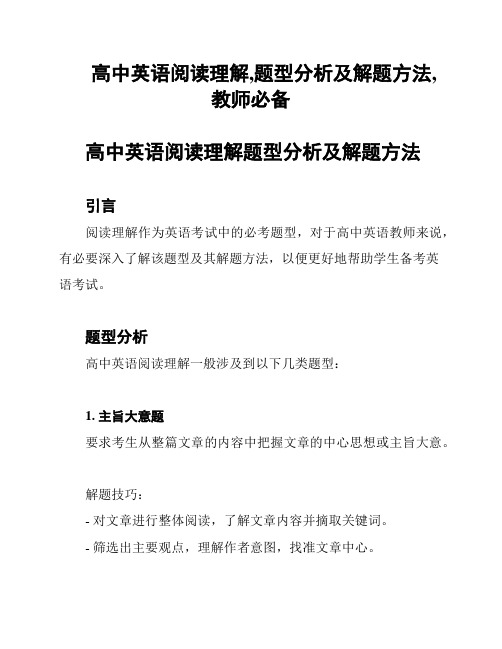
高中英语阅读理解,题型分析及解题方法,教师必备高中英语阅读理解题型分析及解题方法引言阅读理解作为英语考试中的必考题型,对于高中英语教师来说,有必要深入了解该题型及其解题方法,以便更好地帮助学生备考英语考试。
题型分析高中英语阅读理解一般涉及到以下几类题型:1. 主旨大意题要求考生从整篇文章的内容中把握文章的中心思想或主旨大意。
解题技巧:- 对文章进行整体阅读,了解文章内容并摘取关键词。
- 筛选出主要观点,理解作者意图,找准文章中心。
2. 细节理解题要求考生根据文章的细节内容进行推断、判断、分析,回答细节问题。
解题技巧:- 注意文章中的细节,如时间、地点、人物、事件、原因、结果等。
- 关注文章中的关键词,通读全文后进行字面意义的解释。
3. 推理判断题要求考生根据文章内容进行推断、判断或分析。
解题技巧:- 通过对文章内容的分析和理解,判断文章中信息的真假、可靠程度等。
- 利用逻辑推理的思路,根据与文章相关的已知事实进行推断。
4. 作者态度题要求考生根据文章对某一现象或问题的描述,判断作者对该现象或问题所持的态度。
解题技巧:- 仔细分析文章中的用词、句式、语气、修辞手法等,判断作者态度。
- 断定作者态度时,应注意区分作者表层的即时态度和深层的长期态度。
解题方法在解答高中英语阅读理解题型时,考生需要掌握一些解题技巧,如:- 对于生词、短语和句型要紧扣文章内容理解,通过上下文语境或语言风格等方式进行推理。
- 针对细节理解题,要仔细阅读文章,注意文章中的时间、地点、人物、事件、原因、结果等关键信息。
- 在解答作者态度题时,要从词句表达、修辞手法和语气等多方面入手进行分析和判断。
结论通过对高中英语阅读理解题型的分析和解题方法的讲解,相信广大英语教师会对教学中如何指导学生有效备考这一题型有更加深刻的了解。
高考英语任务型阅读试题分析及培养策略
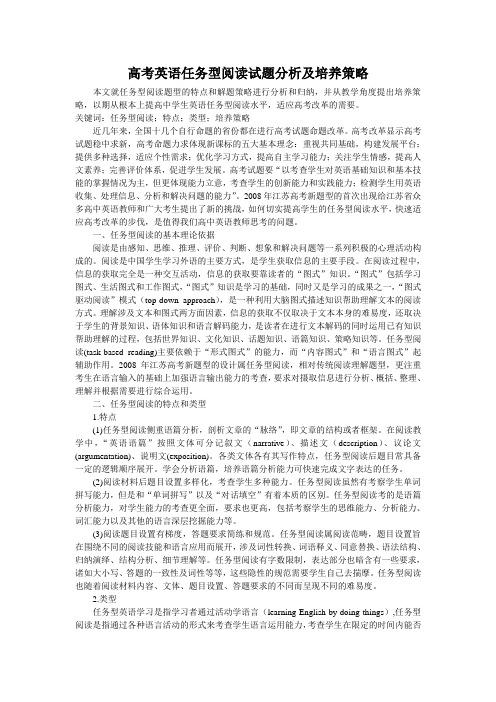
高考英语任务型阅读试题分析及培养策略本文就任务型阅读题型的特点和解题策略进行分析和归纳,并从教学角度提出培养策略,以期从根本上提高中学生英语任务型阅读水平,适应高考改革的需要。
关键词:任务型阅读;特点;类型;培养策略近几年来,全国十几个自行命题的省份都在进行高考试题命题改革。
高考改革显示高考试题稳中求新,高考命题力求体现新课标的五大基本理念:重视共同基础,构建发展平台;提供多种选择,适应个性需求;优化学习方式,提高自主学习能力;关注学生情感,提高人文素养;完善评价体系,促进学生发展。
高考试题要“以考查学生对英语基础知识和基本技能的掌握情况为主,但更体现能力立意,考查学生的创新能力和实践能力;检测学生用英语收集、处理信息、分析和解决问题的能力”。
2008年江苏高考新题型的首次出现给江苏省众多高中英语教师和广大考生提出了新的挑战,如何切实提高学生的任务型阅读水平,快速适应高考改革的步伐,是值得我们高中英语教师思考的问题。
一、任务型阅读的基本理论依据阅读是由感知、思维、推理、评价、判断、想象和解决问题等一系列积极的心理活动构成的。
阅读是中国学生学习外语的主要方式,是学生获取信息的主要手段。
在阅读过程中,信息的获取完全是一种交互活动,信息的获取要靠读者的“图式”知识。
“图式”包括学习图式、生活图式和工作图式,“图式”知识是学习的基础,同时又是学习的成果之一,“图式驱动阅读”模式(top-down approach),是一种利用大脑图式描述知识帮助理解文本的阅读方式。
理解涉及文本和图式两方面因素,信息的获取不仅取决于文本本身的难易度,还取决于学生的背景知识、语体知识和语言解码能力,是读者在进行文本解码的同时运用已有知识帮助理解的过程,包括世界知识、文化知识、话题知识、语篇知识、策略知识等。
任务型阅读(task-based reading)主要依赖于“形式图式”的能力,而“内容图式”和“语言图式”起辅助作用。
- 1、下载文档前请自行甄别文档内容的完整性,平台不提供额外的编辑、内容补充、找答案等附加服务。
- 2、"仅部分预览"的文档,不可在线预览部分如存在完整性等问题,可反馈申请退款(可完整预览的文档不适用该条件!)。
- 3、如文档侵犯您的权益,请联系客服反馈,我们会尽快为您处理(人工客服工作时间:9:00-18:30)。
全市高三英语第6讲高考文学作品阅读及任务型阅读经典题分析、策略指导与训练(一)文学作品阅读一、题型分析“文学与艺术”是高中新课标24话题之一。
该话题主要包括各种文学类型、艺术形式、文化名人以及艺术家等方面。
高考英语阅读理解常涉及文学与艺术话题,旨在要求考生在日常生活中多关注当代文学与艺术的发展动向,多涉足文学与艺术领域,亲自去感受文学与艺术的魅力,开阔视野,提升文学素养。
本课我们将主要探讨如何做好文学作品的阅读。
1.高考英语阅读理解中文学作品的常见形式:1)文学作品原文或选段,如2019年江苏高考试题阅读理解D篇。
2)与经典文学作品相关的介绍、评论、反思等文章,如2012年江苏高考试题阅读理解D 篇。
2.高考英语阅读理解中文学作品的命题特点:1)文章普遍较长,字数多在600字以上。
2)文章多以记叙文为主,在阅读时需关注文学作品的常见六大要素(setting,characters,plot,feeling,symbolism,theme)3. 真题链接【2019年江苏高考试题阅读理解D篇】The 65-year-old Steve Goodwin was found s uffering from early Alzheimer’s(阿尔楚海默症). He was losing his memory.A software engineer by profession, Steve was a keen lover of the piano, and the only musician in his family. Music was his true passion, though he had never performed outside the family.Melissa, his daughter, felt it more than worthwhile to save his music, to which she fell asleep catch night when she was young. She thought about hiring a professional pianist to work with her father.Naomi, Melissa’s best friend and a talented pianist, got to know about this and showed willingness to help.“Why do this?” Steve wondered.“Because she cares.” Melissa said.Steve nodded, tears in eye.Naomi drove to the Goodwin home. She told Steve she’d love to hear him play. Steve moved to the piano and sat at the bench, hands trembling as he gently placed his fingers on the keys.Naomi put a small recorder near the piano, Starts and stops and mistakes. Long pauses, heart sinking. But Steve pressed on, playing for the first time in his life for a stranger.“It was beautiful." Naomi said after listening to the recording. “The music was worth saving.”Her responsibility, her privilege, would be to rescue it. The music was sill in Steve Goodwin. It was bidden in rooms with doors about to be locked.Naomi and Steve met every other week and spent hours together. He’d move his fingers clumsily on the piano, and then she’d take his place. He struggled to explain what he heard in his head. He stood by the piano, eyes closed, listening for the first time to his own work being played by someone else.Steve and Naomi spoke in musical code lines, beats, intervals, moving from the root to end a song in a new key. Steve heard it. All of it. He just couldn’t play it.Working with Naomi did wonders for Steve. It had excited within him the belief he could write one last song. One day, Naomi received an email. Attached was a recording, a recording of loss and love, of the fight. Steve called it “Melancholy Flower”.Naomi heard multiple stops and starts, Steve struggling, searching while his wife Joni called him “honey” and encouraged him. The task was so hard, and Steve, angry and upset, said he was quitting. Joni praised him, telling her husband this could be his signature piece.Naomi managed to figure out 16 of Steve’s favorite, and most personal songs. With Naomi’s help, the Goodwin family found a sound engineer to record Naomi playing Steve’s songs. Joni thought that would be the end. But it wasn’t.In the months leading up to the 2016 Oregon Repertory Singers Christmas concert, Naomi told the director she had a special one in mind: “Melancholy Flower”She told the director about her project with Steve. The director agreed to add it to the playing list. But Naomi would have to ask Steve’s permission. He considered it an honor.Af ter the concert, Naomi told the family that Steve’s music was beautiful and professional. It needed to be shared in public.The family rented a former church in downtown Portland and scheduled a concert. By the day of the show, more than 300 people had said they would attend.By then, Steve was having a hard time remembering the names of some of his friends. He knew the path his life was now taking. He told his family he was at peace.Steve arrived and sat in the front row, surrounded by his family. The house lights faded. Naomi took the stage. Her fingers. His heart.65.Why did Melissa want to save her father’s music?A. His music could stop his disease from worsening.B. She wanted to please her dying old father.C. His music deserved to be preserved in the family.D. She wanted to make her father a professional.66.After hearing Steve’s playing, Naomi ________.A. refused to make a comment on itB. was deeply impressed by his musicC. decided to free Steve from sufferingD. regretted offering help to her friend67.How can the process of Steve’s recording be described?A. It was slow but productive.B. It was beneficial to his health.C. It was tiresome for Naomi.D. It was vital for Naomi’s career.68.Before Steve finished “Melancholy Flowe r," his wife Joni _______.A. thought the music talent of Steve was exhaustedB. didn’t expect the damage thedisease brought aboutC. didn’t fully realize the value of her husband’s musicD. brought her husband’s music careerto perfection69.How did Steve feel at the concert held in downtown Portland?A. He felt concerned about his illness.B. He sensed a responsibility for music.C. He regained his faith in music.D. He got into a state of quiet.70.What can be a suitable title for the passage?A. The Kindness of FriendsB. The Power of MusicC. The Making of a MusicianD. The Value of Determination二、技法点拨1. 核心技法:读文求快,解题求准2. 读文技法:1)核心词汇读文法例如:文章第一段The 65-year-old Steve Goodwin was found suffering from early Alzheimer’s (阿尔楚海默症). He was losing his memory. 其中Steve Goodwin,Alzheimer’s (阿尔楚海默症),losing his memory,都是关键词,抓住这些关键词我们就可以轻松理解句意“65岁的古德云被发现患有早期阿尔茨海默氏症,他失去了记忆”,并为文章的进一步阅读打下良好基础。
